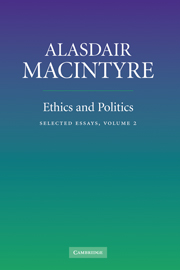Book contents
- Frontmatter
- Contents
- Preface
- Acknowledgments
- PART I LEARNING FROM ARISTOTLE AND AQUINAS
- PART II ETHICS
- PART III THE POLITICS OF ETHICS
- 8 Three perspectives on Marxism: 1953, 1968, 1995
- 9 Poetry as political philosophy: notes on Burke and Yeats
- 10 Some Enlightenment projects reconsidered
- 11 Social structures and their threats to moral agency
- 12 Toleration and the goods of conflict
- Index
10 - Some Enlightenment projects reconsidered
Published online by Cambridge University Press: 27 January 2010
- Frontmatter
- Contents
- Preface
- Acknowledgments
- PART I LEARNING FROM ARISTOTLE AND AQUINAS
- PART II ETHICS
- PART III THE POLITICS OF ETHICS
- 8 Three perspectives on Marxism: 1953, 1968, 1995
- 9 Poetry as political philosophy: notes on Burke and Yeats
- 10 Some Enlightenment projects reconsidered
- 11 Social structures and their threats to moral agency
- 12 Toleration and the goods of conflict
- Index
Summary
The Enlightenment is of course an historian's construction. There were several of them, French, Scottish, and German, each complex and heterogeneous. Nonetheless we can identify some major shared themes and projects, each of which claimed and still claims the badge of Enlightenment. There is, first of all, the attempt to define enlightenment by drawing a distinction between the unenlightened and the enlightened, unenlightened them and enlightened us. Here the canonical text was and is Kant's Beantwortung der Frage: Was ist Aufklärung? of 1784. And Kant's text has of course had its heirs and successors, most recently Foucault's of 1984, whose title repeats Kant's Was ist Aufklärung? (“What is Enlightenment?”)
Both Kant and Foucault defined Enlightenment as primarily a task, the task of achieving a condition in which human beings think for themselves rather than in accordance with the prescriptions of some authority. For Kant in 1784 such reasoning in the sphere of morality requires the adoption of the standpoint of what he took to be universal reason, a standpoint independent of the particularities of kinship and political ties, of one's culture and one's religion. But how is this standpoint to be characterized? About this widespread disagreement had already been generated by a second major Enlightenment project, that of specifying in detail the nature and content of the moral rules that universal reason requires, a project embodied in what were to become canonical Enlightenment texts by authors as various as Locke, Hume, Smith, Diderot, Bentham, Robespierre, Jefferson, and Kant himself, each of these affirming positions incompatible in some respects with those of most or all of the others.
- Type
- Chapter
- Information
- Ethics and PoliticsSelected Essays, pp. 172 - 185Publisher: Cambridge University PressPrint publication year: 2006
- 6
- Cited by



